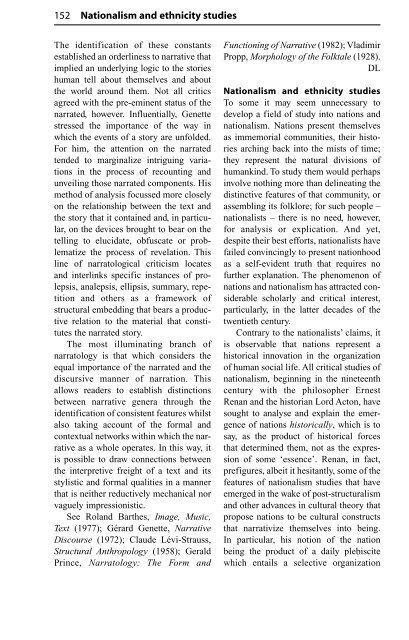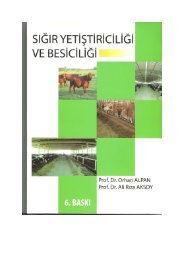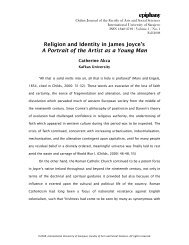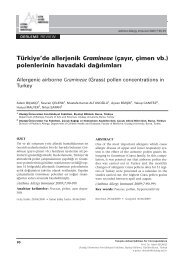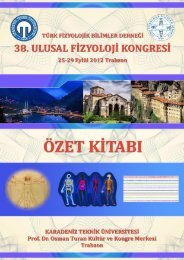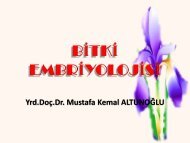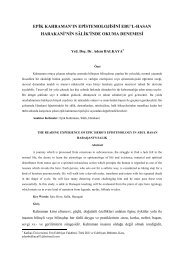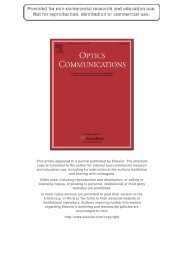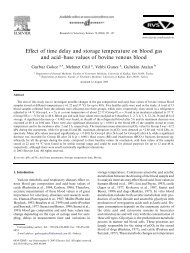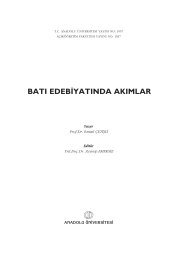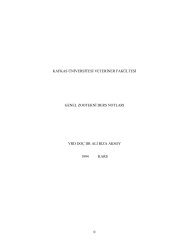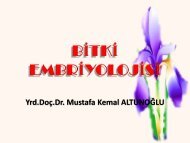The Routledge Dictionary of Literary Terms
The Routledge Dictionary of Literary Terms
The Routledge Dictionary of Literary Terms
You also want an ePaper? Increase the reach of your titles
YUMPU automatically turns print PDFs into web optimized ePapers that Google loves.
152 Nationalism and ethnicity studies<br />
<strong>The</strong> identification <strong>of</strong> these constants<br />
established an orderliness to narrative that<br />
implied an underlying logic to the stories<br />
human tell about themselves and about<br />
the world around them. Not all critics<br />
agreed with the pre-eminent status <strong>of</strong> the<br />
narrated, however. Influentially, Genette<br />
stressed the importance <strong>of</strong> the way in<br />
which the events <strong>of</strong> a story are unfolded.<br />
For him, the attention on the narrated<br />
tended to marginalize intriguing variations<br />
in the process <strong>of</strong> recounting and<br />
unveiling those narrated components. His<br />
method <strong>of</strong> analysis focussed more closely<br />
on the relationship between the text and<br />
the story that it contained and, in particular,<br />
on the devices brought to bear on the<br />
telling to elucidate, obfuscate or problematize<br />
the process <strong>of</strong> revelation. This<br />
line <strong>of</strong> narratological criticism locates<br />
and interlinks specific instances <strong>of</strong> prolepsis,<br />
analepsis, ellipsis, summary, repetition<br />
and others as a framework <strong>of</strong><br />
structural embedding that bears a productive<br />
relation to the material that constitutes<br />
the narrated story.<br />
<strong>The</strong> most illuminating branch <strong>of</strong><br />
narratology is that which considers the<br />
equal importance <strong>of</strong> the narrated and the<br />
discursive manner <strong>of</strong> narration. This<br />
allows readers to establish distinctions<br />
between narrative genera through the<br />
identification <strong>of</strong> consistent features whilst<br />
also taking account <strong>of</strong> the formal and<br />
contextual networks within which the narrative<br />
as a whole operates. In this way, it<br />
is possible to draw connections between<br />
the interpretive freight <strong>of</strong> a text and its<br />
stylistic and formal qualities in a manner<br />
that is neither reductively mechanical nor<br />
vaguely impressionistic.<br />
See Roland Barthes, Image, Music,<br />
Text (1977); Gérard Genette, Narrative<br />
Discourse (1972); Claude Lévi-Strauss,<br />
Structural Anthropology (1958); Gerald<br />
Prince, Narratology: <strong>The</strong> Form and<br />
Functioning <strong>of</strong> Narrative (1982); Vladimir<br />
Propp, Morphology <strong>of</strong> the Folktale (1928).<br />
DL<br />
Nationalism and ethnicity studies<br />
To some it may seem unnecessary to<br />
develop a field <strong>of</strong> study into nations and<br />
nationalism. Nations present themselves<br />
as immemorial communities, their histories<br />
arching back into the mists <strong>of</strong> time;<br />
they represent the natural divisions <strong>of</strong><br />
humankind. To study them would perhaps<br />
involve nothing more than delineating the<br />
distinctive features <strong>of</strong> that community, or<br />
assembling its folklore; for such people –<br />
nationalists – there is no need, however,<br />
for analysis or explication. And yet,<br />
despite their best efforts, nationalists have<br />
failed convincingly to present nationhood<br />
as a self-evident truth that requires no<br />
further explanation. <strong>The</strong> phenomenon <strong>of</strong><br />
nations and nationalism has attracted considerable<br />
scholarly and critical interest,<br />
particularly, in the latter decades <strong>of</strong> the<br />
twentieth century.<br />
Contrary to the nationalists’ claims, it<br />
is observable that nations represent a<br />
historical innovation in the organization<br />
<strong>of</strong> human social life. All critical studies <strong>of</strong><br />
nationalism, beginning in the nineteenth<br />
century with the philosopher Ernest<br />
Renan and the historian Lord Acton, have<br />
sought to analyse and explain the emergence<br />
<strong>of</strong> nations historically, which is to<br />
say, as the product <strong>of</strong> historical forces<br />
that determined them, not as the expression<br />
<strong>of</strong> some ‘essence’. Renan, in fact,<br />
prefigures, albeit it hesitantly, some <strong>of</strong> the<br />
features <strong>of</strong> nationalism studies that have<br />
emerged in the wake <strong>of</strong> post-structuralism<br />
and other advances in cultural theory that<br />
propose nations to be cultural constructs<br />
that narrativize themselves into being.<br />
In particular, his notion <strong>of</strong> the nation<br />
being the product <strong>of</strong> a daily plebiscite<br />
which entails a selective organization


